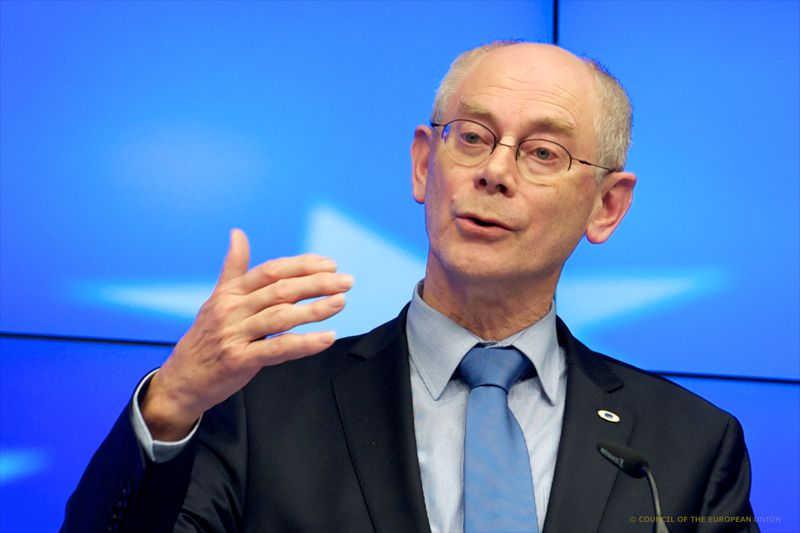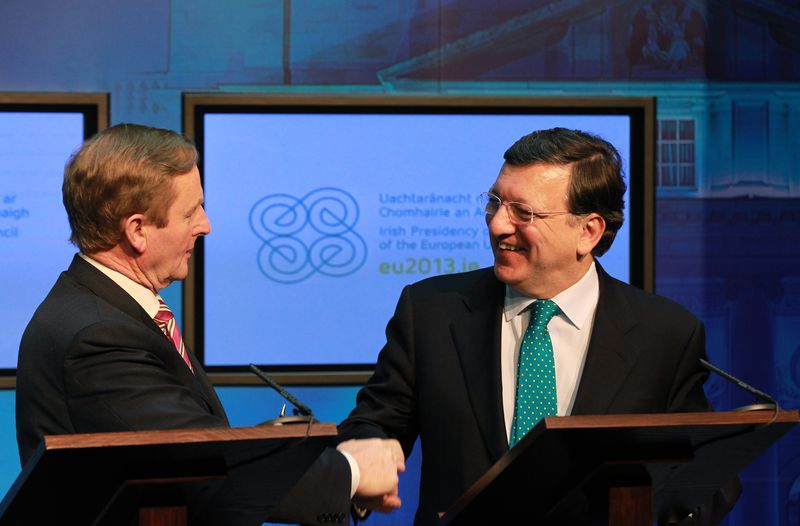Everything Is Perfect, But Where is the Growth?
Adelina Marini, March 12, 2013
 On Thursday and Friday, in Brussels, the leaders of the EU member states will gather together for their spring summit which, as the tradition goes, will be dedicated on economic policies. On the agenda of the summit are the topics about progress under the European semester, the Annual Growth Survey, the implementation of the agreed in June last year Growth Pact and the harmonisation of legislation related to the first Single Market Act, but with the second as well. A little less than two months lasted the slight exhilaration in Brussels, provoked by some indirect and relatively positive developments that gave ground to European politicians to claim - some cautiously, others more boldly - that the crisis is over. But from the letters of European Council President Herman Van Rompuy and Jose Manuel Barroso, the European Commission chief, it becomes clear that something is wrong.
On Thursday and Friday, in Brussels, the leaders of the EU member states will gather together for their spring summit which, as the tradition goes, will be dedicated on economic policies. On the agenda of the summit are the topics about progress under the European semester, the Annual Growth Survey, the implementation of the agreed in June last year Growth Pact and the harmonisation of legislation related to the first Single Market Act, but with the second as well. A little less than two months lasted the slight exhilaration in Brussels, provoked by some indirect and relatively positive developments that gave ground to European politicians to claim - some cautiously, others more boldly - that the crisis is over. But from the letters of European Council President Herman Van Rompuy and Jose Manuel Barroso, the European Commission chief, it becomes clear that something is wrong.
Both point out that, indeed, a lot of work has been done both on EU and national level for the stabilisation of the European economy. The winter forecast of the Commission, however, has cooled down the emotions because it envisages slow and fragile recovery of the economy. This means, Herman Van Rompuy writes to the leaders, that in 2013 pressure for structural reforms should continue, the purpose of which is to boost European competitiveness. Also needed is to work to enhance confidence in European economy which means that those with their belts tightened will remain tightened and those who by far thought that this was not their issue, will have to revise their positions.
For his part, Mr Barroso points out that last year was disappointing and as a result perspectives remain tough. The growth of the gross domestic product is expected this year to be around 0.1% in the entire EU and minus 0.3% in the eurozone. We saw improvement in the financial market conditions in the second half of 2012, Barroso admits, but this has not led to the expected recovery of the real economy and unemployment rose to unprecedented levels in many EU member states. Jose Manuel Barroso has prepared several presentations for the leaders, two of which consist only of tables. And they speak for themselves. The first presentation contains data about the gross domestic product, unemployment, public deficit and government debt, while the second shows the trends in the current account balance and the unit labour costs.
Herman Van Rompuy has prepared a kind of rebuke for the member states because, he believes, very few of the commitments have been fulfilled. He starts his letter by recalling that precisely two years ago the leaders invited the Council and Parliament to adopt all the 12 priority measures in the first Single Market Act by the end of 2012. "We all agreed", Mr Van Rompuy recalls, "that your Ministers should prioritise them in their works". In spite of the significant efforts of the Council presidencies, the deadline is missed and not only a few measures are adopted, but as a matter of fact most of them are not. "This delay is hard to justify", says the chief of the European Council and underscores that this casts doubt over the resolve to undertake specific measures to raise the European economy back on its feet.
Only a few are the dossiers on which work is well advanced. Soon to come is an agreement on the implementation of the accounting directive which will reduce administrative burden for millions of European small and medium-sized enterprises. Also soon are expected to end the negotiations on recognition of professional qualifications which, according to Mr Rompuy, will solve two acute problems of the European economy: unacceptably high unemployment rates and the shortage of highly qualified workers. Near to an end is also the agreement for public procurement. Work on these three files could be completed before July 2013, the European president believes.
Huge delays there are on the rest of the files in the Single Market Act I: still the e-signature is not adopted, the rules for energy taxation, the common consolidated base for corporate tax. Herman Van Rompuy calls for flexibility of national positions in order to achieve a compromise. "We need more robust progress on these files. Therefore, I appeal to you to muster sufficient political will to close these negotiations as early as possible this year, as a matter of urgency", is the president's appeal. There is no progress, too, on another legislation which is two years old - solving the problem with delayed payments which is a huge obstacle notably for the small and mid-sized businesses.
In spite of the requests and appeals of Mr Van Rompuy, however, it is very likely the leaders to spend much of their time on pros and cons for the austerity measures. This dispute has been bubbling for quite some time now and very soon is expected to burst forth. A reason for its beginning was a working paper of the International Monetary Fund's chief economist Olivier Blanchard who admits that excessive belt tightening in fact leads to stifling of the economy. And although this is only a working paper, not the official stance of the Fund, which participates with money and surveillance in preventing the default of troubled eurozone countries, some of the bailout states where recovery of balances was/is most severe took advantage of the report to insist on belt loosening. Most recognisable is Greece's voice.
European Commission Vice President Olli Rehn, however, is relentless. His boss Jose Manuel Barroso also points out in his letter to the leaders that some programme countries are doing very well with adjustment. From the document he intends to show the leaders it becomes clear that the countries that apply reforms steadfast already bear the fruits of their efforts. It is necessary the member states to invest more in structural reforms to be able to overcome the significant loss of competitiveness, Barroso writes. Probably, the most telling example at the summit will be Ireland. Recently, IMF chief Christine Lagarde underlined the country's achievements in a speech in Dublin. Then  she recalled that the Irish economy was among those which had the hardest landing with a loss of GDP of 8%, increase of unemployment by 15%, public debt of 100% after bailing out the crashing banking system.
she recalled that the Irish economy was among those which had the hardest landing with a loss of GDP of 8%, increase of unemployment by 15%, public debt of 100% after bailing out the crashing banking system.
Today Ireland is very different, Lagarde said on March 8th, but it is still facing tough challenges mainly related to the EU because "EU's destiny is a destiny of Ireland too". According to her, the main problems are very similar everywhere - high indebtedness of households, banks, corporations and governments. It is expected recession in the eurozone to continue this year too. Under such circumstances, macro economic policy could support demand, Ms Lagarde believes, and that can happen via the monetary policy of the European Central Bank aimed at reducing rates. More of the Outright Monetary Transactions could support the member states' efforts to reduce funding costs.
The leaders will also review at their spring summit the report of the Presidency which summarises the main positions stated so far in the Council. The main message of the Presidency is that fiscal consolidation has to continue in parallel with growth enhancing measures. Recovery of normal lending to the economy is also an issue which will be discussed. But for the purpose, all member states have to stick to their commitments under the Stability and Growth Pact and to ensure correction of excessive deficit in line with the agreed deadlines. Another very important recommendation that will be heard on March 14-15 is reform of pension systems. According to the Presidency, the undertaken or current reforms in most cases do not ensure sustainability.
In spite of the recommendations, progress is limited. Also necessary is to improve tax collection and the efficiency of the tax administration. Important, too, are the reforms of the education system to ensure that tertiary education and vocational training respond to the current and future needs of the labour market. Education should also pay attention on young people and to pursue the objective the number of early school-leavers to be reduced according to the objectives in the Europe 2020 strategy. Progress is also needed on another priority, outlined in the Annual Growth Survey - modernisation of public administration with a special focus on reducing administrative and regulatory burden, improving business environment, e-government, EU funds absorption and efficiency of the judiciary.
The most interesting thing that is expected from this European Council is that it will tell us more about the real political impact from the reforms of the economic governance adopted in the past years - from the review of the Stability and Growth Pact to the very recent adoption of the two key legislative proposals, known as the two-pack, Antonio Vitorino believes, a former EU commissioner and currently a director of the Notre Europe think-tank, founded by Jacques Delors. Mr Vitorino also expects the member states' leaders to show whether they have learnt the lessons from the crisis which most of all demonstrated the great interdependence of the European countries. As usually, euinside will cover the summit. You can follow us in Facebook and Twitter, as well as to read in our special topic for the summit.
 | © EU
| © EU